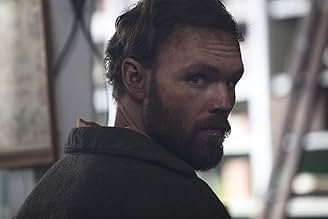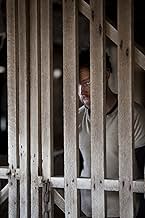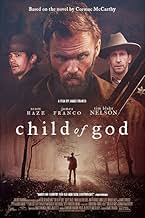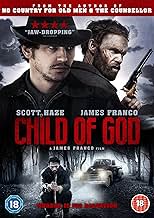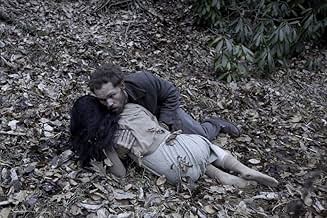IMDb रेटिंग
5.4/10
4.5 हज़ार
आपकी रेटिंग
अपनी भाषा में प्लॉट जोड़ेंA dispossessed, violent man's disastrous attempt to exist outside the social order.A dispossessed, violent man's disastrous attempt to exist outside the social order.A dispossessed, violent man's disastrous attempt to exist outside the social order.
- निर्देशक
- लेखक
- स्टार
- पुरस्कार
- 2 जीत और कुल 1 नामांकन
Ciera Danielle
- Salesgirl
- (as Cierra Parrack)
फ़ीचर्ड समीक्षाएं
Scott Haze's performance as Lester Ballad is remarkable, but this film is simply depressing--unless that is, your idea of entertainment is spending 100 minutes watching a man of limited intelligence spiral into insanity after his farm is sold out from under him.
I thought my neighbour was a slightly mad, uncouth and antisocial individual, and he sounds a lot like Ballard, so maybe he's a distant relative.
I thought my neighbour was a slightly mad, uncouth and antisocial individual, and he sounds a lot like Ballard, so maybe he's a distant relative.
James Franco seems to be trying to make a reputation for himself as a director who will tackle "classic novels" that were considered to be unfilmable, as he did with AS I LAY DYING. Let's say this about the Cormac McCarthy source novel, though. You will hear a lot of praise heaped upon it by the literary intellectuals. What you hear, though, is that the author has an original way with his prose, or that it's well known for a distinctive writing style that is missing common punctuation. What you don't usually hear is "this is a stunningly original and exciting story". It's the style that is praised more than the story.
That has an obvious effect on this movie, then, as you cannot translate the prose to the screen (though Franco tries by injecting voice- overs and on screen text containing actual excerpts). What you are left with is a story that isn't all that exciting and has been done plenty of times. Yes, the necrophilia angle takes it further than most movies are willing to go, but in the end, this is just another Ed Gein influenced horror tales. What it desperately needed was to have something more happen in the actual events of the story. There is very little actual action and very little occurs in this movie. Prepare yourself to spend a great deal of the run time following our main character as he wanders around in the woods talking to himself.
It is the main character and the acting by Scott Haze that is the central reason anyone would want to watch this movie. It is mainly a character study of one man, who we meet in the beginning clearly already suffering from mental illness. Through the course of the events of the story, we watch his mental health further degrade until he is little more than a primal animal, living in a cave and acting out his sexual deviances on whatever victims stumble his way. Haze does an excellent job of portraying this character, who mostly mumbles his way through the movie, putting the emphasis on Haze to portray the characters mental instability through his facial expression. The character could have become a cardboard cutout villain, but through the acting of Haze and some directing by Franco, the character definitely has his sympathetic moments where we feel for the situations that have put him down this course in life.
Ultimately, though, I was just bored through most of the movie. I don't mind artistic. I don't mind low budget. I don't mind experimental. I am not someone who just doesn't have a tolerance for this style of film making. Instead, the only real action is a botched lynching that he escapes from far too conveniently. I just kept waiting for something to happen and it never did, including a huge letdown ending.
That has an obvious effect on this movie, then, as you cannot translate the prose to the screen (though Franco tries by injecting voice- overs and on screen text containing actual excerpts). What you are left with is a story that isn't all that exciting and has been done plenty of times. Yes, the necrophilia angle takes it further than most movies are willing to go, but in the end, this is just another Ed Gein influenced horror tales. What it desperately needed was to have something more happen in the actual events of the story. There is very little actual action and very little occurs in this movie. Prepare yourself to spend a great deal of the run time following our main character as he wanders around in the woods talking to himself.
It is the main character and the acting by Scott Haze that is the central reason anyone would want to watch this movie. It is mainly a character study of one man, who we meet in the beginning clearly already suffering from mental illness. Through the course of the events of the story, we watch his mental health further degrade until he is little more than a primal animal, living in a cave and acting out his sexual deviances on whatever victims stumble his way. Haze does an excellent job of portraying this character, who mostly mumbles his way through the movie, putting the emphasis on Haze to portray the characters mental instability through his facial expression. The character could have become a cardboard cutout villain, but through the acting of Haze and some directing by Franco, the character definitely has his sympathetic moments where we feel for the situations that have put him down this course in life.
Ultimately, though, I was just bored through most of the movie. I don't mind artistic. I don't mind low budget. I don't mind experimental. I am not someone who just doesn't have a tolerance for this style of film making. Instead, the only real action is a botched lynching that he escapes from far too conveniently. I just kept waiting for something to happen and it never did, including a huge letdown ending.
Based in the novel of the same name written by Cormac McCarthy (No Country For Old Men, The Road). This is very dark film and certainly not for everyone, but I would recommend it to cinephiles based on the incredible, visceral performance by Haze. He is Lester Ballard. As despicable and vile as his behavior is, there is buried within him a human quality. He just wants what all humans desire – to be accepted and loved.
The film sticks very closely to the book, with only 2 scenes expanded from the original text. It is most definitely one of the most faithful adaptations I've ever seen. The direction is fairly solid, the use of long takes and natural action is apparent, making everything on-screen seem genuine. All of the camera work is hand-held, which can be disorienting at times but it, in a way, adds to the aesthetic of the film. The music used is subtle yet appropriate. Overall, like I said , a very dark film with very strong subject matter, but it's well done.
The film sticks very closely to the book, with only 2 scenes expanded from the original text. It is most definitely one of the most faithful adaptations I've ever seen. The direction is fairly solid, the use of long takes and natural action is apparent, making everything on-screen seem genuine. All of the camera work is hand-held, which can be disorienting at times but it, in a way, adds to the aesthetic of the film. The music used is subtle yet appropriate. Overall, like I said , a very dark film with very strong subject matter, but it's well done.
Lester Ballard (Scott Haze) is a disturbed man living in the rural mountains of Tennessee in the 60s. His father killed himself and his mother ran away. His father's property is auctioned off and he becomes a recluse. He gets in trouble with Sheriff Fate (Tim Blake Nelson) after he struggled with a drunken woman. He steals and is a general nuisance. He runs across a young couple dead in their car. He has sex with the dead girl and steals her body away.
I think this is the only movie where a character is actually taking a dump. I've got to say that it's disturbing and gross. It sets the tone for the whole movie. Scott Haze is terrific in his performance. The main problem is that the movie is uninvolving. After awhile, Lester's insanity feels repetitive and lifeless. His isolation infiltrates into the movie. This movie needs more time for Sheriff Fate. I also wonder why the sheriff can't put him away longer and how bad the dead body smells. These are the little things that nag at me when the movie stops being compelling. James Franco's directions are workable but they need to energize the plot more.
I think this is the only movie where a character is actually taking a dump. I've got to say that it's disturbing and gross. It sets the tone for the whole movie. Scott Haze is terrific in his performance. The main problem is that the movie is uninvolving. After awhile, Lester's insanity feels repetitive and lifeless. His isolation infiltrates into the movie. This movie needs more time for Sheriff Fate. I also wonder why the sheriff can't put him away longer and how bad the dead body smells. These are the little things that nag at me when the movie stops being compelling. James Franco's directions are workable but they need to energize the plot more.
I sat still after the United States premiere of James Franco's "Child of God" at the New York Film Festival, not as much contemplating whether or not it was good as I was considering whether or not I liked it. Mostly true to the Cormac McCarthy novel on which it was based, the film follows the cloistered and violent existence of Lester Ballard (Scott Haze) who lives isolated in the woods of Tennessee committing crimes of the most grotesque caliber. I won't say much more about the plot other than the fact that the sadistic actions shown on screen evoke an uneasy humor, a disturbing essence of comical brutality. To say the least, this movie is not for the queasy or the fainthearted. You will squirm.
Organization:
James Franco decided to organize the film into three acts, clearly distinguished from one another by title cards. While the producer argued this was done to manifest the passage of time, I felt it had no such effect. To add to this distortion of time and space, scenes are executed as vignettes. There's a constant transition fading in and out of the action, not only prompting confusion as to how much time passes between each scene, but also distracting the audience from the plot by means of excessive filmmaking. Some scenes exist solely for the purpose of character development while others seem to have no function at all. The relevant vignettes are strung together by a consistently distressed brain. While this structure may detract from the linear storyline, it instead leaves more up to interpretation and imagination. No number of scenes can embody the true insanity of Lester Ballard, we can only imagine what madness must be going on between the fades.
Performances:
Scott Haze's performance as Lester Ballard is probably the most memorable and noteworthy aspect of the film. Haze, who lived alone in caves and lost 45 pounds to prepare for this dynamic and challenging role, brilliantly expresses the complex lunacy of Ballard. He adjusted his voice to a barely comprehensible Tennessee accent and habitually licks his lips and bares his teeth, similar to Heath Ledger's Joker. Admitting that he channeled troubles from his own past when confronting the character, Haze often appears ignorant and childlike, constantly screaming and salivating, a repulsive portrait of a man bore from nature's womb. While sometimes funny, his interactions with his victims are unsettling yet strangely amorous. Just like in the writing of Cormac McCarthy, the audience lacks any sympathy for Ballard, for it's nearly impossible to relate to him. Franco isn't looking for your sympathy, he wants nothing more than your intrigue and attention. To witness Haze is to observe an animal, wild, vicious, and savage. The only other notable performance is that of Tim Blake Nelson playing Sheriff Fate. He conducted the role with a mediated honesty, constructing as realistic a character as possible and standing out within the frame, even with minimal screen time.
Technicalities:
All things considered, the technical aspects of the film are quite impressive. Funded out of James Franco's own pocket, the movie looks and sounds great considering its modest budget. The cinematography of the rural Tennessee landscape is eerily beautiful, shot hand-held on a handful of Canon 5Ds. The desaturated and gritty colors add an appropriate rustic feel to the film, further enhancing the forest terrain. The original music, although not particularly memorable, suits the setting well. Furthermore, the nameless narration was true to McCarthy's technique and certainly added to the tone of the film, keeping the audience attentive all the same. Overall, the movie's unsensational filmmaking is entirely fitting, ensuring the horrors on screen are ever more explicit, ever more real.
Conclusion:
You can tame the land, but you can't tame a man. "Child of God" is a commentary about the dispossessed in an incestuous homeland. Littered with existential imagery and dialogue, the film offers a respectful and honest rendering of the novel. While I may not agree with some storytelling elements and approaches, Franco still manages to get the point across and deliver a message, a testament to rejection, violence, and humanity. The film is definitely worth a watch if you can stomach it and works as a cogent visual supplement to the novel. I look forward to seeing more James Franco adaptations in the future.
Organization:
James Franco decided to organize the film into three acts, clearly distinguished from one another by title cards. While the producer argued this was done to manifest the passage of time, I felt it had no such effect. To add to this distortion of time and space, scenes are executed as vignettes. There's a constant transition fading in and out of the action, not only prompting confusion as to how much time passes between each scene, but also distracting the audience from the plot by means of excessive filmmaking. Some scenes exist solely for the purpose of character development while others seem to have no function at all. The relevant vignettes are strung together by a consistently distressed brain. While this structure may detract from the linear storyline, it instead leaves more up to interpretation and imagination. No number of scenes can embody the true insanity of Lester Ballard, we can only imagine what madness must be going on between the fades.
Performances:
Scott Haze's performance as Lester Ballard is probably the most memorable and noteworthy aspect of the film. Haze, who lived alone in caves and lost 45 pounds to prepare for this dynamic and challenging role, brilliantly expresses the complex lunacy of Ballard. He adjusted his voice to a barely comprehensible Tennessee accent and habitually licks his lips and bares his teeth, similar to Heath Ledger's Joker. Admitting that he channeled troubles from his own past when confronting the character, Haze often appears ignorant and childlike, constantly screaming and salivating, a repulsive portrait of a man bore from nature's womb. While sometimes funny, his interactions with his victims are unsettling yet strangely amorous. Just like in the writing of Cormac McCarthy, the audience lacks any sympathy for Ballard, for it's nearly impossible to relate to him. Franco isn't looking for your sympathy, he wants nothing more than your intrigue and attention. To witness Haze is to observe an animal, wild, vicious, and savage. The only other notable performance is that of Tim Blake Nelson playing Sheriff Fate. He conducted the role with a mediated honesty, constructing as realistic a character as possible and standing out within the frame, even with minimal screen time.
Technicalities:
All things considered, the technical aspects of the film are quite impressive. Funded out of James Franco's own pocket, the movie looks and sounds great considering its modest budget. The cinematography of the rural Tennessee landscape is eerily beautiful, shot hand-held on a handful of Canon 5Ds. The desaturated and gritty colors add an appropriate rustic feel to the film, further enhancing the forest terrain. The original music, although not particularly memorable, suits the setting well. Furthermore, the nameless narration was true to McCarthy's technique and certainly added to the tone of the film, keeping the audience attentive all the same. Overall, the movie's unsensational filmmaking is entirely fitting, ensuring the horrors on screen are ever more explicit, ever more real.
Conclusion:
You can tame the land, but you can't tame a man. "Child of God" is a commentary about the dispossessed in an incestuous homeland. Littered with existential imagery and dialogue, the film offers a respectful and honest rendering of the novel. While I may not agree with some storytelling elements and approaches, Franco still manages to get the point across and deliver a message, a testament to rejection, violence, and humanity. The film is definitely worth a watch if you can stomach it and works as a cogent visual supplement to the novel. I look forward to seeing more James Franco adaptations in the future.
क्या आपको पता है
- ट्रिवियाScott Haze moved to Sevierville, TN, to prepare for the role of Lester Ballard. He lived in an isolated cabin in the woods, lost 50 pounds and was reportedly sleeping in caves some nights.
- गूफ़Lester seems to have an endless supply of bullets.
- भाव
[repeated line]
Lester Ballard: Get off my fuckin property!
- कनेक्शनFeatured in Filmselskabet: एपिसोड #4.1 (2013)
टॉप पसंद
रेटिंग देने के लिए साइन-इन करें और वैयक्तिकृत सुझावों के लिए वॉचलिस्ट करें
- How long is Child of God?Alexa द्वारा संचालित
विवरण
- रिलीज़ की तारीख़
- कंट्री ऑफ़ ओरिजिन
- आधिकारिक साइटें
- भाषा
- इस रूप में भी जाना जाता है
- Tanrının Oğlu
- फ़िल्माने की जगहें
- उत्पादन कंपनियां
- IMDbPro पर और कंपनी क्रेडिट देखें
बॉक्स ऑफ़िस
- US और कनाडा में सकल
- $39,324
- US और कनाडा में पहले सप्ताह में कुल कमाई
- $27,630
- 3 अग॰ 2014
- दुनिया भर में सकल
- $39,324
- चलने की अवधि
- 1 घं 44 मि(104 min)
- रंग
- ध्वनि मिश्रण
- पक्ष अनुपात
- 1.85 : 1
इस पेज में योगदान दें
किसी बदलाव का सुझाव दें या अनुपलब्ध कॉन्टेंट जोड़ें




